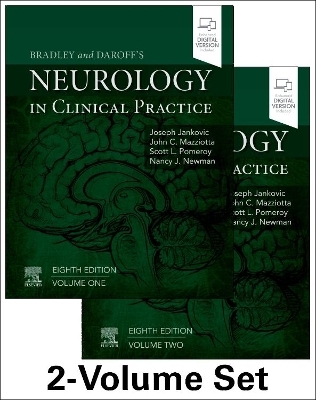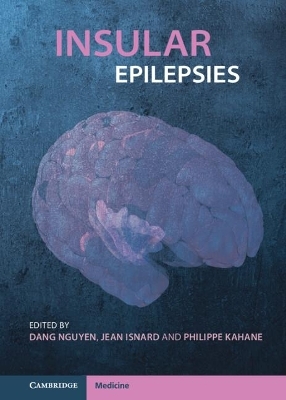
Bradley and Daroff's Neurology in Clinical Practice, 2-Volume Set
Elsevier - Health Sciences Division
978-0-323-64261-3 (ISBN)
Covers all aspects of today’s neurology in an easy-to-read, clinically relevant manner.
Allows for easy searches through an intuitive organization by both symptom and grouping of diseases.
Features new and expanded content on movement disorders, genetic and immunologic disorders, tropical neurology, neuro-ophthalmology and neuro-otology, palliative care, pediatric neurology, and new and emerging therapies.
Offers even more detailed videos that depict how neurological disorders manifest, including EEG and seizures, deep brain stimulation for PD and tremor, sleep disorders, movement disorders, ocular oscillations, EMG evaluation, cranial neuropathies, and disorders of upper and lower motor neurons, as well as other neurologic signs.
Enhanced eBook version included with purchase. Your enhanced eBook allows you to access all of the text, figures, and references from the book on a variety of devices.
Scott L. Pomeroy is an internationally known expert on the biological origins, treatment and long-term outcomes of childhood brain tumors. He has served as the Chair of the Department of Neurology and Neurologist-in-Chief of Boston Children's Hospital since 2005. Dr. Pomeroy graduated summa cum laude and Phi Beta Kappa from Miami University in 1975 and in 1982 was the first graduate of the M.D., Ph.D. program of the University of Cincinnati. He trained in pediatrics at Boston Children's Hospital/Harvard Medical School and in child neurology at St. Louis Children's Hospital/Washington University of St. Louis. In 1989, he won the Child Neurology Society Young Investigator Award for work done as a postdoctoral fellow of Dale Purves. The Pomeroy lab focuses on understanding the molecular and cellular basis of medulloblastomas and other embryonal brain tumors. Dr. Pomeroy has served as an ad hoc and chartered member of many NIH study sections, as co-Editor of Neurology in Clinical Practice and Associate Editor of Annals of Neurology, as President of the Child Neurology Foundation and as a member of the Dana Alliance for Brain Initiatives. He has received numerous awards including the Sidney Carter Award of the American Academy of Neurology, the Daniel Drake Medal of the University of Cincinnati, the inaugural Compassionate Caregiver Award of the Kenneth Schwartz Center, and the Bernard Sachs Award of the Child Neurology Society. In 2017, he was elected a member of the U.S. National Academy of Medicine.
Part I: Common Neurological Problems
1. Diagnosis of Neurological Disease
2. Episodic Impairment of Consciousness
3. Falls and Drop Attacks
4. Delirium
5. Stupor and Coma
6. Brain Death, Vegetative, and Minimally Conscious States
7. Intellectual and Memory Impairments
8. Global Developmental Delay and Regression
9. Behavior and Personality Disturbances
10. Depression and Psychosis in Neurological Practice
11. Limb Apraxias and Related Disorders
12. Agnosias
13. Aphasia and Aphasic Syndromes
14. Dysarthria and Apraxia of Speech
15. Neurogenic Dysphagia
16. Neuro-Ophthalmology: Afferent Visual System
17. Pupillary and Eyelid Abnormalities
18. Neuro-ophthalmology: Ocular Motor System
19. Disturbances of Smell and Taste
20. Cranial and Facial Pain
21. Brainstem Syndromes
22. Neuro-otology: Diagnosis and Management of Neuro-otological Disorders
23. Cerebellar Ataxia
24. Diagnosis and Assessment of Parkinson disease and other movement disorders
25. Gait Disorders
26. Hemiplegia and Monoplegia
27. Paraplegia, Diplegia, and Spinal Cord Syndromes
28. Proximal, Distal, and Generalized Weakness
29. Muscle Pain and Cramps
30. Hypotonic (Floppy) Infant
31. Sensory Abnormalities of the Limbs, Trunk, and Face
32. Arm and Neck Pain
33. Lower Back and Lower Limb Pain
Part II: Neurological Investigations and Interventions
34. Investigations in Diagnosis and Management of Neurological Disease
35. Electroencephalography and Evoked Potentials
36. Clinical Electromyography
37. Extracranial Neuromodulation
38. Intracranial Neuromodulation
39. Intraoperative Monitoring
40. Structural Imaging using Magnetic Resonance Imaging and Computed Tomography
41. Vascular Imaging using Computed Tomographic Angiography, Magnetic Resonance Angiography, and Ultrasound
42. Functional and Chemical Imaging
43. Ocular Functional and Structural Investigations
44. Neuropsychology
45. Neurourology
46. Sexual Dysfunction in Neurologic Disorders
47. Neuroepidemiology
48. Clinical Neurogenetics
49. Neuroimmunology
50. Neuroendocrinology
Part III: Neurological Diseases and their Treatment
51. Management of Neurological Disease
52. Pain Management
53. Neurointensive Care
54. Principles of NeuroEndovascular Therapy
55. Neurological Rehabilitation
56. Transition Neurology
57. Neurological Complications of Systemic Disease in Adults
58. Neurological Complications of Systemic Disease in Children
59. Basic Neuroscience of Neurotrauma
60. Sports Related Concussion
61. Craniocerebral Trauma
62. Spinal Cord Trauma
63. Peripheral Nerve Trauma
64. Ischemic Cerebrovascular Disease
65. Intracerebral Hemorrhage
66. Intracranial Aneurysms and Subarachnoid Hemorrhage
67. Stroke in Children
68. Spinal Cord Vascular Disease
69. Central Nervous System Vasculitis
70. Epidemiology of Brain Tumors
71. Pathology and Molecular Genetics of Brain Tumors
72. Clinical Features of Brain Tumors and Complications of their Treatment
73. Primary Nervous System Tumors in Adults
74. Primary Nervous System Tumors in Infants and Children
75. Nervous System Metastases
76. Neurological Manifestations of Human Immunodeficiency Virus Infection in Adults
77. Viral Encephalitis and Meningitis
78. Bacterial, Fungal and Parasitic Diseases of the Nervous System
79. Multiple Sclerosis and Other Inflammatory Demyelinating Diseases of the Central Nervous System
80. Paraneoplastic disorders of the nervous system
81. Autoimmune encephalopathies with antibodies to cell surface antigens
82. Anoxic-Ischemic Encephalopathy
83. Toxic and Metabolic Encephalopathies
84. Deficiency Diseases of the Nervous System
85. Effects of Toxins and Physical Agents on the Nervous System
86. Effects of Drug Abuse on the Nervous System
87. Brain Edema and Disorders of Cerebrospinal Fluid Circulation
88. Developmental Disorders of the Nervous System
89. Autism and Other Developmental Disabilities
90. Inborn Errors of Metabolism of the Nervous System
91. Mechanisms of Neurodegenerative Disorders
92. Mitochondrial Disorders
93. Prion Diseases
94. Alzheimer's Disease and other Dementias
95. Parkinsonian and Other Movement Disorders
96. Disorders of the Cerebellum, Including the Degenerative Ataxias
97. Disorders of Upper and Lower Motor Neurons
98. Channelopathies: Episodic and Electrical Disorders of the Nervous System
99. Neurocutaneous Syndromes
100. Epilepsies
101. Sleep and Its Disorders
102. Headache and Other Craniofacial Pain
103. Cranial Neuropathies
104. Disorders of Bones, Joints, Ligaments, and Meninges
105. Disorders of Nerve Roots and Plexuses
106. Disorders of Peripheral Nerves
107. Disorders of the Autonomic Nervous System
108. Disorders of Neuromuscular Transmission
109. Disorders of Skeletal Muscle
110. Neurological Problems of the Newborn
111. Cerebral Palsy
112. Neurological Problems of Pregnancy
113. Psychogenic, Functional and Dissociative Neurological Symptoms
114. Palliative and End of Life Care in Neurological Disease
| Erscheint lt. Verlag | 1.11.2021 |
|---|---|
| Verlagsort | Philadelphia |
| Sprache | englisch |
| Maße | 216 x 276 mm |
| Gewicht | 7070 g |
| Themenwelt | Medizin / Pharmazie ► Medizinische Fachgebiete ► Neurologie |
| ISBN-10 | 0-323-64261-6 / 0323642616 |
| ISBN-13 | 978-0-323-64261-3 / 9780323642613 |
| Zustand | Neuware |
| Haben Sie eine Frage zum Produkt? |
aus dem Bereich


